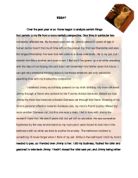Jasmine Yu
October 8th, 2008
Essay Prompt:
Montressor is a remorseless killer, yet the reader is invited to sympathize with his loosely defined quest for revenge.
- How does Poe’s use of characterization and voice prevent us from condemning Montressor’s actions?
When used efficiently, the characterization and voice of a story can prevent the reader from condemning a character’s actions. In horror novels, readers enjoy reading about plots that contain horrific bloody details on the deaths of innocent victims. Usually, the thought of death is painful for most humans but when we are engaged in a book we overlook the victims agony, instead we feed off of it to make ourselves feel complete and jubilant. We also make ourselves believe that the villains always have a motive to kill or harm others. This motive is our sanctuary. We are so sadistic and malevolent that we think that any motive to kill is acceptable, and this allows us to imagine ourselves as the killer. The characterization of characters and how the story is told can also make us believe that the killer is not truly the villain because we are told to think that the victim caused their own death. In “The Cask of Amontillado” Poe uses characterization and voice to prevent the reader from condemning Montressor’s actions. This is shown when Montressor immediately admits to the reader that he is going to commit a crime, Montressor also tells us exactly how he kills Fortunato, and Fortunato is characterized as a very proud person.
In “The Cask of Amontillado” Montressor immediately admits to the reader that he will kill Fortunato, because Fortunato insulted him, from this we realize that there is an external conflict between the two men. Montressor tells the reader that “The thousand injuries of Fortunato I had borne as best I could; but when he ventured upon insult I vowed revenge” (Poe, 1). This means that Montressor is sick of Fortunato, and wants revenge because Fortunato goaded him. Montressor’s motive for killing Fortunato was because he was insulted by him. The voice of the story makes the reader forgive Montressor for wanting to kill a person because he had a motive for doing so. In addition, Montressor also states that he wants to punish Fortunato. Montressor makes this very clearly when he says “I must not only punish, but punish with impunity. A wrong is unredressed when retribution overtakes its redresser” (Poe, 1). Montressor wants to punish Fortunato without having to be punished himself, because he thinks that would be superfluous. This is how Montressor is going to kill Fortunato. He is going to kill him very mysteriously, so no one can assume that he was the one that committed the murder. Finally, Montressor admits to the reader that he will commit a crime, which he will not be accused of committing, because Montressor admits that he will commit a crime due to a motive the reader slightly forgives him and wonders how the conflict between Fortunato and Montressor will end.







